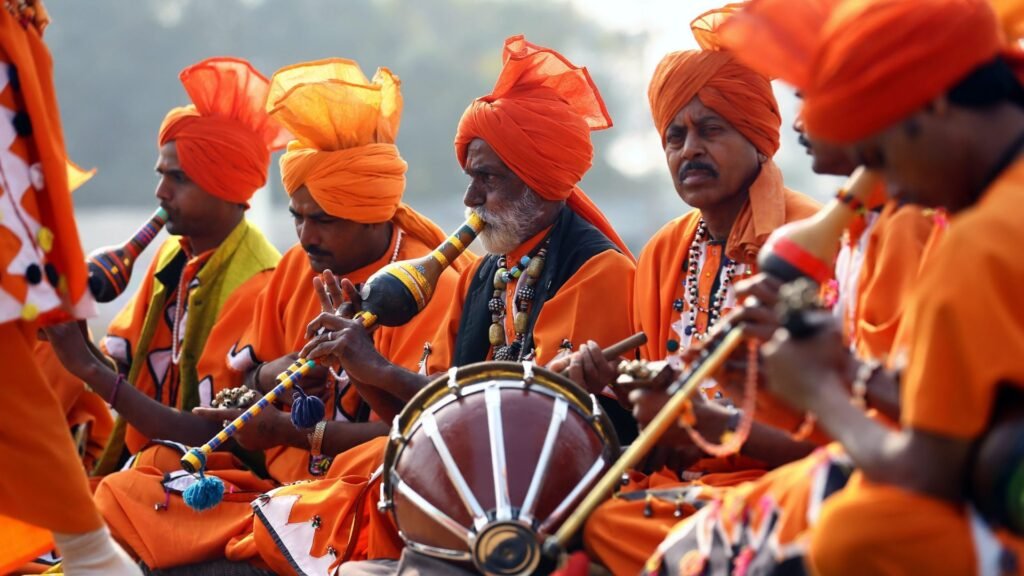Indian music is influential across cultures for several compelling reasons. Its unique elements, rich history, and adaptability contribute to its global appeal and impact. Let’s give you the reasons why.
**1. Diverse Musical Traditions
One of the main reasons Indian music is influential across cultures is its diversity. Indian music encompasses a wide range of styles and traditions, from classical and folk to contemporary genres. This variety allows it to resonate with audiences from different cultural backgrounds. Each tradition offers distinct sounds and rhythms, contributing to its widespread influence.

**2. Rich Historical Legacy
Indian music has a long and rich historical legacy that adds to its global influence. With centuries of development, it includes ancient texts, legendary composers, and traditional instruments. This deep history provides a unique perspective and depth that attracts interest from people around the world. Understanding this heritage helps explain why Indian music is influential across cultures.
**3. Innovative Fusion with Other Genres
Indian music is known for its ability to blend with other musical genres. Many artists incorporate Indian rhythms and instruments into Western styles, such as jazz, pop, and electronic music. This fusion creates new and exciting sounds that appeal to global audiences. The innovation in blending Indian music with different genres showcases its adaptability and broadens its influence.
**4. Unique Rhythmic Patterns
Indian music features unique rhythmic patterns and structures that captivate listeners. The use of complex time signatures and intricate rhythms stands out in global music. These patterns offer a refreshing change from more common rhythmic structures found in other musical traditions. The distinctiveness of Indian rhythmic patterns contributes significantly to why Indian music is influential across cultures.
**5. Expressive Vocal Techniques
Indian music is characterized by its expressive vocal techniques, such as intricate ornamentation and varied tonal expressions. These techniques convey a wide range of emotions and stories, making the music deeply engaging. The expressiveness in Indian vocal styles allows it to connect with audiences from diverse backgrounds, further establishing its influence across cultures.
**6. Influential Film Music
The impact of Indian music is also evident in its film industry, which has a massive global audience. Bollywood and other regional film industries produce music that blends traditional and modern elements, attracting listeners worldwide. Popular Indian film songs and soundtracks have gained international recognition, showcasing how Indian music influences and appeals to different cultures.
**7. Cultural Celebrations and Festivals
Indian music plays a central role in cultural celebrations and festivals, which are often celebrated worldwide. Festivals such as Diwali, Holi, and Navratri feature vibrant music that spreads Indian cultural traditions globally. The presence of Indian music in these celebrations helps increase its reach and influence across different cultures.
**8. Global Performances and Tours
Indian musicians frequently perform and tour internationally, bringing their music to new audiences. These global performances offer a firsthand experience of Indian music, fostering a greater appreciation among diverse cultural groups. The exposure gained from international tours helps enhance the influence of Indian music around the world.
**9. Educational Programs and Workshops
Educational programs and workshops focused on Indian music also contribute to its global influence. Many institutions and online platforms offer courses and classes on Indian musical traditions, making it accessible to learners everywhere. These educational efforts help spread awareness and appreciation of Indian music across various cultures.
**10. Crossover Collaborations
Crossover collaborations between Indian artists and global musicians further demonstrate the influence of Indian music across cultures. These collaborations often result in innovative musical projects that blend different styles and cultures. Such partnerships highlight the global appeal of Indian music and its ability to resonate with audiences worldwide.
**11. Digital Platforms and Streaming
The rise of digital platforms and streaming services has made Indian music more accessible globally. Services like Spotify, Apple Music, and YouTube allow listeners from different cultures to easily discover and enjoy Indian music. The availability of Indian music on these platforms enhances its influence across a broad international audience.
**12. Rich Instrumentation
Indian music features a diverse range of traditional instruments, such as the sitar, tabla, and veena. These instruments produce unique sounds that distinguish Indian music from other traditions. The distinctive timbres and playing techniques of Indian instruments contribute to the global fascination with Indian music.
**13. Emphasis on Improvisation
Improvisation is a key element in Indian music, particularly in classical traditions. This emphasis on spontaneous creativity adds a dynamic and unpredictable quality to the music. The improvisational nature of Indian music attracts listeners who appreciate the creativity and skill involved, enhancing its global influence.
**14. Spiritual and Emotional Appeal
Indian music often has a spiritual and emotional dimension that resonates with people worldwide. Many compositions are designed to evoke specific feelings or states of mind, offering a profound listening experience. This emotional depth makes Indian music appealing across various cultural contexts.
**15. Global Music Festivals and Awards
Indian music’s presence in global music festivals and award ceremonies highlights its international impact. Participation in prestigious events and receiving accolades from international bodies affirm its influence and reach. These recognitions help solidify the global status of Indian music.
Conclusion
Indian music is influential across cultures due to its rich traditions, innovative fusions, and unique characteristics. Its ability to connect with diverse audiences through its history, rhythmic patterns, and expressive techniques makes it a significant force in the global music landscape. The ongoing global appreciation of Indian music showcases its lasting impact and widespread appeal.

